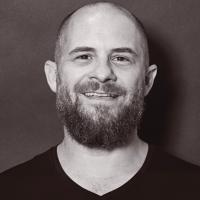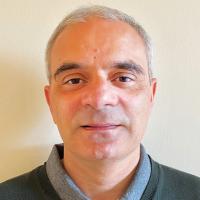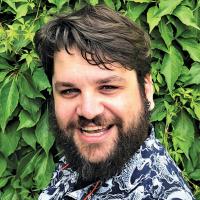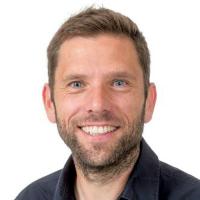
Justin Garson
(Re)Conceptualizing Function and Goal-Directedness, Agential Behavior and Plasticity in Evolution
Putting representations back into goal-directedness
Subaward Principal Investigator
Justin Garson is Professor of Philosophy at Hunter College and The Graduate Center, City University of New York. He is the author of Madness: A Philosophical Exploration (Oxford, 2022), What Biological Functions Are and Why They Matter (Cambridge, 2019), A Critical Overview of Biological Functions (Springer, 2016), and The Biological Mind: A Philosophical Introduction (Routledge, 2015; second edition 2022). His main interest is thinking about teleology in the life sciences and developing its implications for debates in the philosophy of mind, medicine, and psychiatry. His aim for the John Templeton Foundation Science of Purpose Initiative is to explain goal-directedness in living creatures in terms of their capacity to make and use inner representations. In this way, he seeks to place the study of goal-directedness within the context of naturalistic, evolutionary accounts of representation.

Kevin Lala
Agential Behavior and Plasticity in Evolution
Exploratory mechanisms, agency, and evolution
Subaward Principal Investigator
University of St Andrews
Kevin Lala is Professor of Behavioural and Evolutionary Biology at the University of St Andrews, and prior to that held positions at UCL, UC Berkeley and Cambridge Universities. His principle academic interests are in the general area of animal behaviour and evolution, with a specific focus on: (i) animal social learning, innovation and intelligence, (ii) niche construction, inclusive inheritance and the extended evolutionary synthesis, and (iii) human evolution, particularly the evolution of cognition. He has published c. 300 scientific articles on these topics, been the recipient of more than £17m in grant income, and authored 12 books, including Darwin’s Unfinished Symphony. How Culture Made the Human Mind (Princeton UP 2017), and Niche Construction: The Neglected Process in Evolution (with John Odling-Smee and Marc Feldman, Princeton UP, 2003). Laland is an Elected Fellow of the Royal Society of Edinburgh and a Fellow of the Royal Society of Biology.

Thomas Reydon
Agential Behavior and Plasticity in Evolution
Agency and explanation in the evolutionary sciences
Subaward Principal Investigator
Leibniz University Hannover
Thomas Reydon is Professor of Philosophy of Science and Technology in the Institute of Philosophy and the Centre for Ethics and Law in the Life Sciences (CELLS) at Leibniz University Hannover, Germany. He is also Associated Faculty in the Socially Engaged Philosophy of Science (SEPOS) group at Michigan State University. He is a founding member and Board Member of the German Society for Philosophy of Science (GWP), a Steering Committee member of the European Advanced Seminar of the Philosophy of the Life Sciences (EASPLS), a co-Editor in Chief of the Journal for General Philosophy of Science, a co-Editor in Chief of the book series History, Philosophy and Theory of the Life Sciences, and a former Associate Editor of the journal Acta Biotheoretica. His research focuses on evolutionary explanation; applications of evolutionary thinking in and outside the biological sciences; natural history; classification, classificatory concepts & natural kinds; and good academic practice.

Derek Skillings
Agential Behavior and Plasticity in Evolution
Directedness in holobiont systems
Subaward Principal Investigator
Derek Skillings is an Assistant Professor in the Philosophy Department at the University of North Carolina at Greensboro. He specializes in the philosophy of biology, philosophy of science, marine phylogeography and evolutionary ecology. He works primarily on biological individuality and explanation and causal reasoning in biology. He is particularly interested in the problem of how to approach the complex and hierarchical nature of living systems when investigating biological phenomena and constructing explanations.

Tobias Uller
Agential Behavior and Plasticity in Evolution
Evolution and organismal goal-directedness
Subaward Principal Investigator
Lund University
Tobias Uller received his PhD from University of Gothenburg, Sweden, in 2004. Following a postdoctoral fellowship at the University of Wollongong, Australia, he returned to Europe in 2007 to take up a Departmental Lectureship at the University of Oxford. In 2015, he moved to Lund University, Sweden, where he now is Professor of Evolutionary Biology. Uller has held several fellowships, including a Fulbright Fellowship at the University of Arizona, a Royal Society University Research Fellowship at Oxford, and a Wallenberg Academy Fellowship at Lund University. Uller’s research is characterized by an integrative approach – from molecular and developmental biology to ecology – guided by mathematical modelling and conceptual analysis. His projects span a range of topics, but most are designed to reveal how the development, physiology and behaviour of organisms influence their evolution.

Richard Watson
Agential Behavior and Plasticity in Evolution
Evolution and organismal goal-directedness, Exploratory mechanisms, agency, and evolution
Subaward Principal Investigator
University of Southampton
Dr Richard Watson studies evolution, learning, cognition and society and their unifying algorithmic principles. He studied Artificial Intelligence and Adaptive Systems at Sussex University, then PhD Computer Science at Brandeis in Boston. His current work deepens the unification of evolution and learning - specifically, with connectionist models of learning and cognition, familiar in neural network research – to address topics such as evolvability, ecological memory, evolutionary transitions in individuality (ETIs), phenotypic plasticity, the extended evolutionary synthesis, collective intelligence and 'design'. He has also developed new computational methods for combinatorial optimisation (deep optimisation), exploiting a unification of deep learning and ‘deep evolution’ (i.e. ETIs). He is author of "Compositional evolution" (MIT Press), was featured as "one to watch in AI” in Intelligent Systems magazine, and his paper “How Can Evolution Learn” in TREE, attracted the ISAL award 2016. He is now Associate Professor at the University of Southampton.
